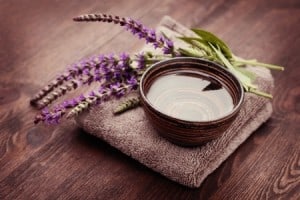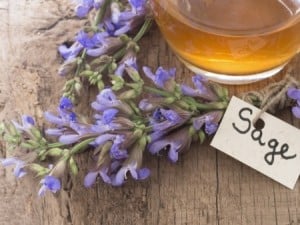Sage is a herb which is not only popular for its culinary uses but for centuries has been renowned for its powerful medicinal properties. It is native to many countries which surround the Mediterranean Sea and has been dubbed as the “secret to long life”. In great Roman mythology it is believed that sage could extend life to the point of immortality. The  famous medieval Emperor “Charlemagne” in fact ordered that sage be grown in all his medical gardens. An adage emerged in the middle ages of “why should a man die while sage grows in his garden?”
famous medieval Emperor “Charlemagne” in fact ordered that sage be grown in all his medical gardens. An adage emerged in the middle ages of “why should a man die while sage grows in his garden?”
Sage contains anti-oxidant and anti-inflammatory properties along with an array of minerals and nutrients including amino acids, magnesium, folate, calcium, iron, manganese and many more. The herb also contains a multitude of vitamins including vitamins A, B6, C, E, K,
Sage and Stress
Sage is a herb with many healing properties but more notably it is known for its therapeutic ability to reduce stress and calm nerves. Many people that lead busy lives struggle to find remedies for stress, other than over the counter medication, but there are many natural alternatives to pharmaceutical drugs. Stress affects both body & mind, therefore it is important to take care in managing stress levels, in order to avoid illness emerging in the body as a result of unhealthy levels of stress.
Sage oil is distilled from the flowering tops of the sage plant and can be found in health stores in the form of essential oil. A great relaxation technique is to take some time out for yourself and burn sage essential oil (100% pure) in your home to help calm the mind. You could also pour a hot bath and add a few drops of sage oil. The steam from the hot water will act as a diffuser, which will help calm nerves and stimulate the senses with its soothing aroma.
Sage Tea
You can prepare a calming tea from the dried leaves of the sage plant. In a saucepan, bring 1-2 cups of water to the boil, then place one teaspoon of dried sage leaves into the hot water. Infuse the sage leaves in the water for several minutes before straining the leaves. Pour into a cup and if needed stir in fresh honey as a sweetener. If you are after a more powerful tonic with a higher concentrate of minerals and a stronger therapeutic effect, use fresh sage leaves. You can find fresh sage at your local market, make sure they are chopped finely before placing them into the boiling water.
1-2 cups of water to the boil, then place one teaspoon of dried sage leaves into the hot water. Infuse the sage leaves in the water for several minutes before straining the leaves. Pour into a cup and if needed stir in fresh honey as a sweetener. If you are after a more powerful tonic with a higher concentrate of minerals and a stronger therapeutic effect, use fresh sage leaves. You can find fresh sage at your local market, make sure they are chopped finely before placing them into the boiling water.
RECIPE RECAP
1x teaspoon of dried or fresh sage leaves placed in boiling water
Honey to taste
SHOPPING LIST
1 x bunch of fresh sage leaves or
1 x packet of dried sage leaves
1 x pot of fresh honey
Resources: History,Myths & Legends of Aromatherapy www.aromaticamedica.tripod.com/id23.html
Sage nutrition profile: http://nutritiondata.self.com/facts/spices-and-herbs/208/2




Leave A Comment